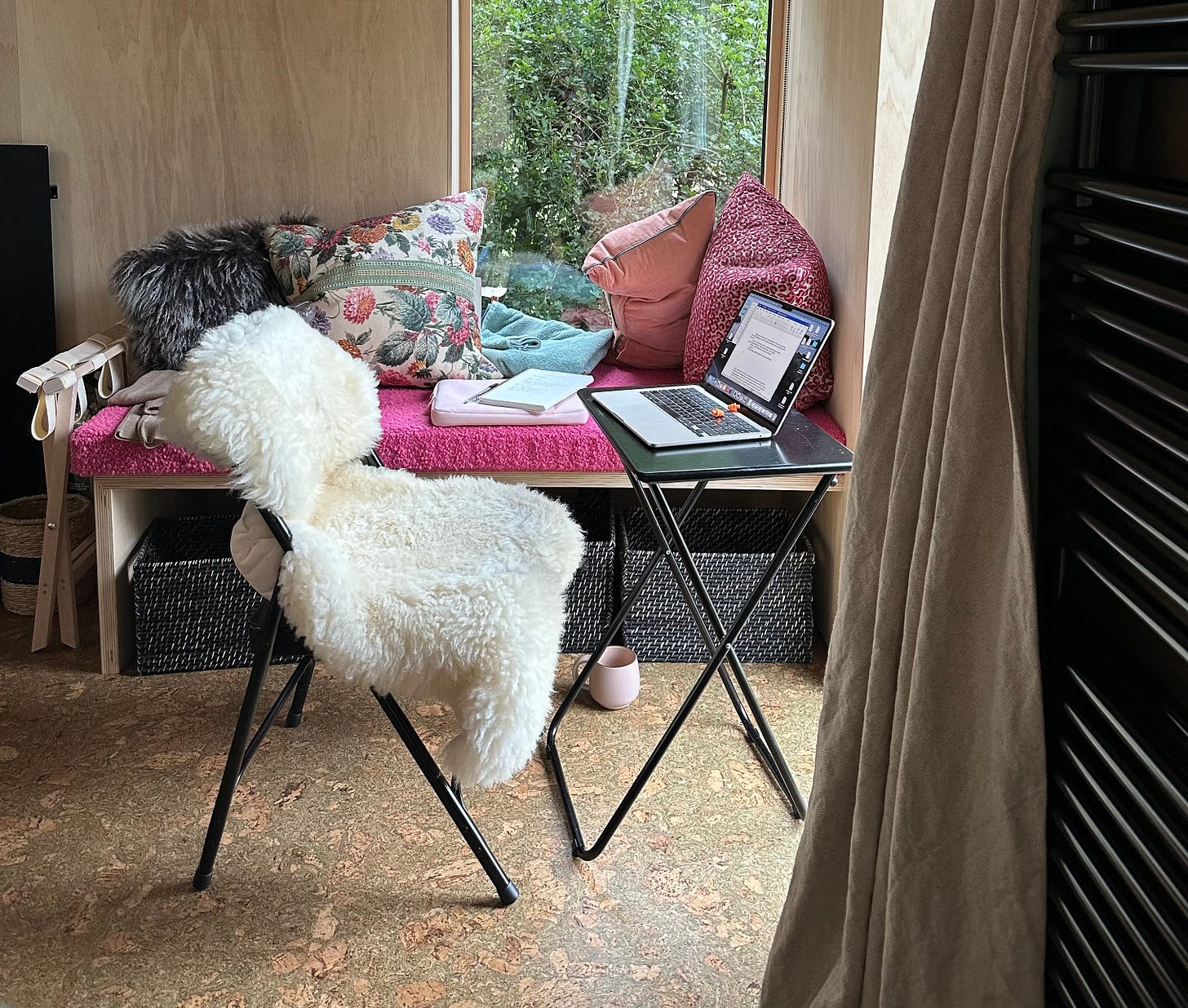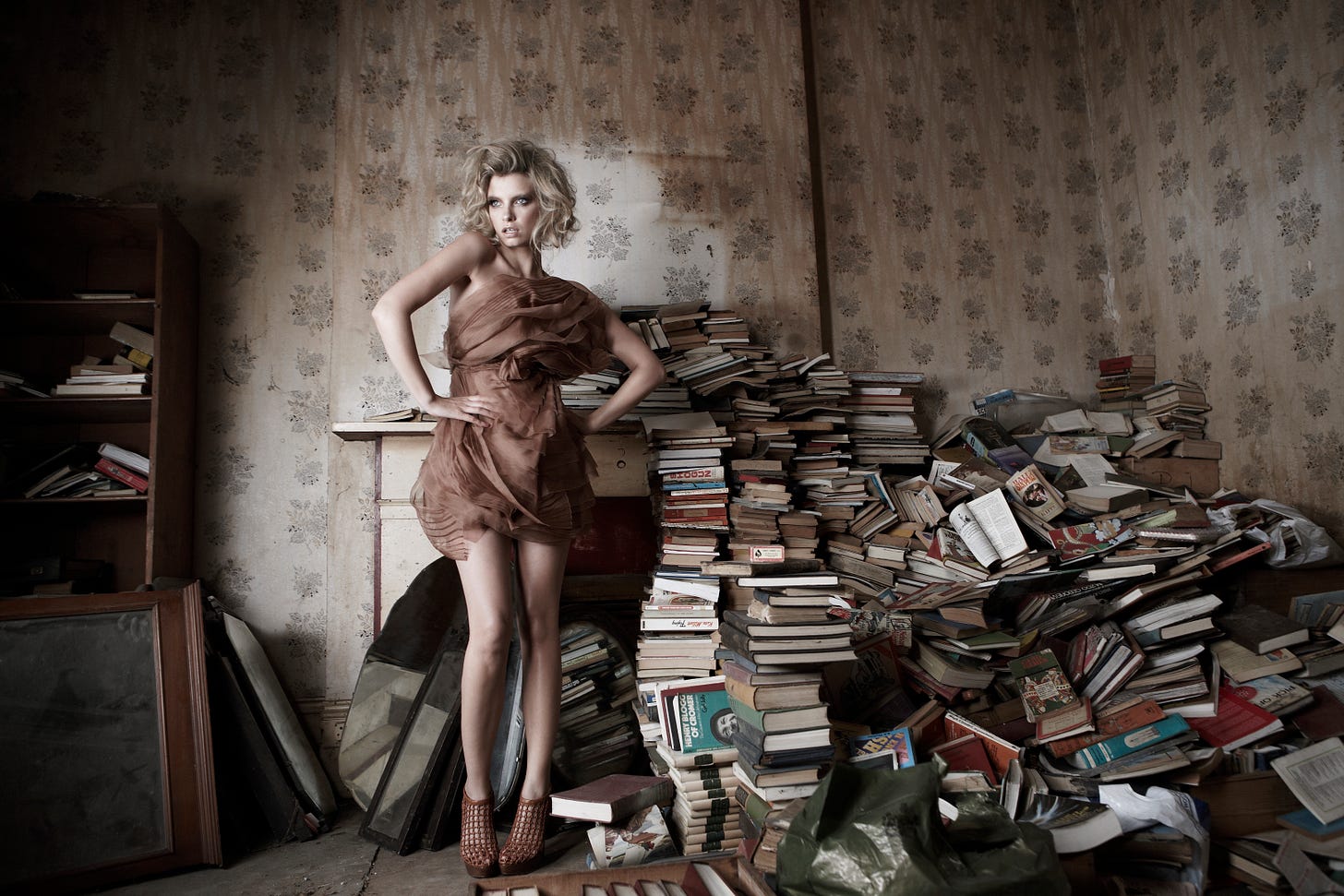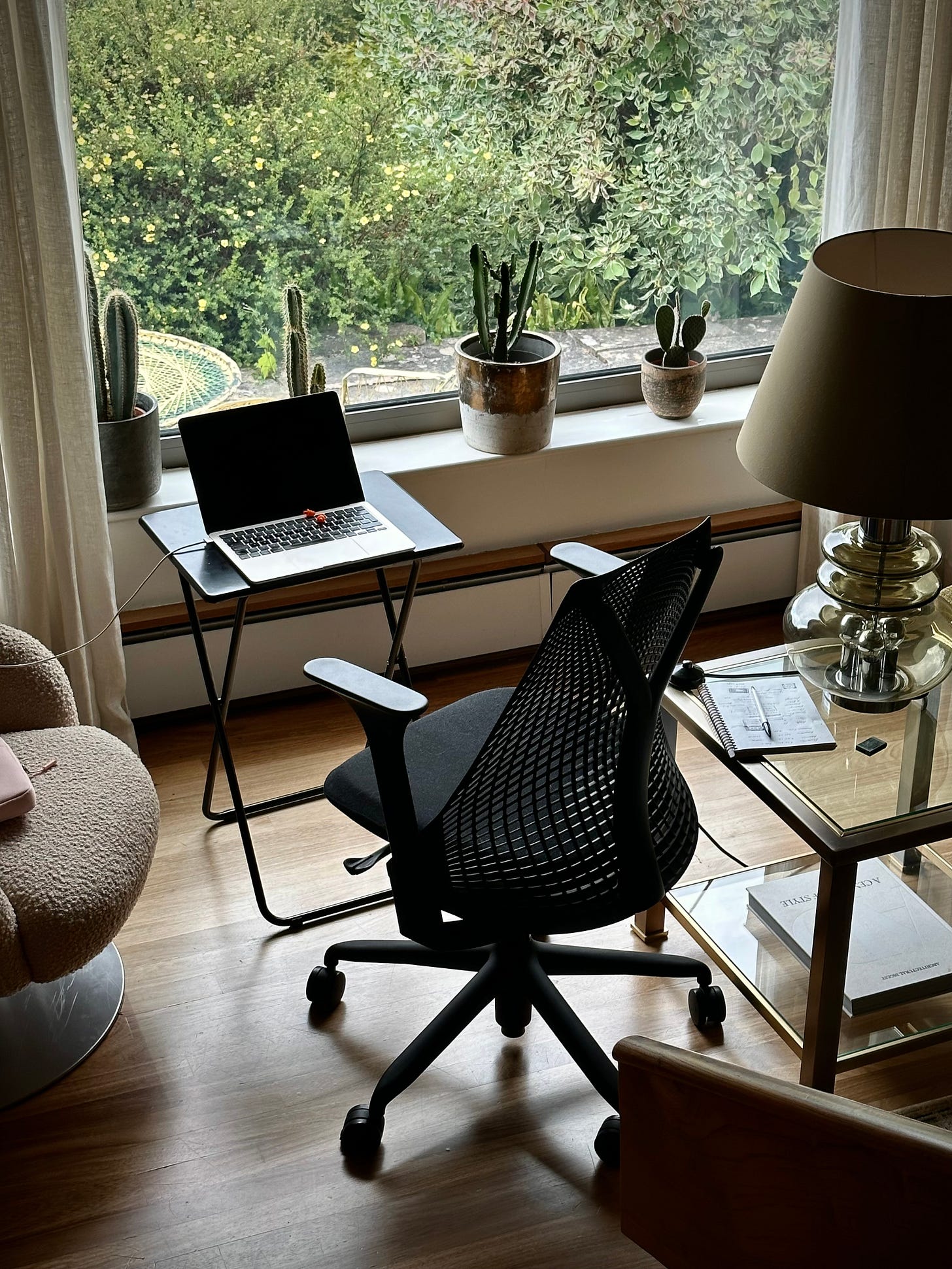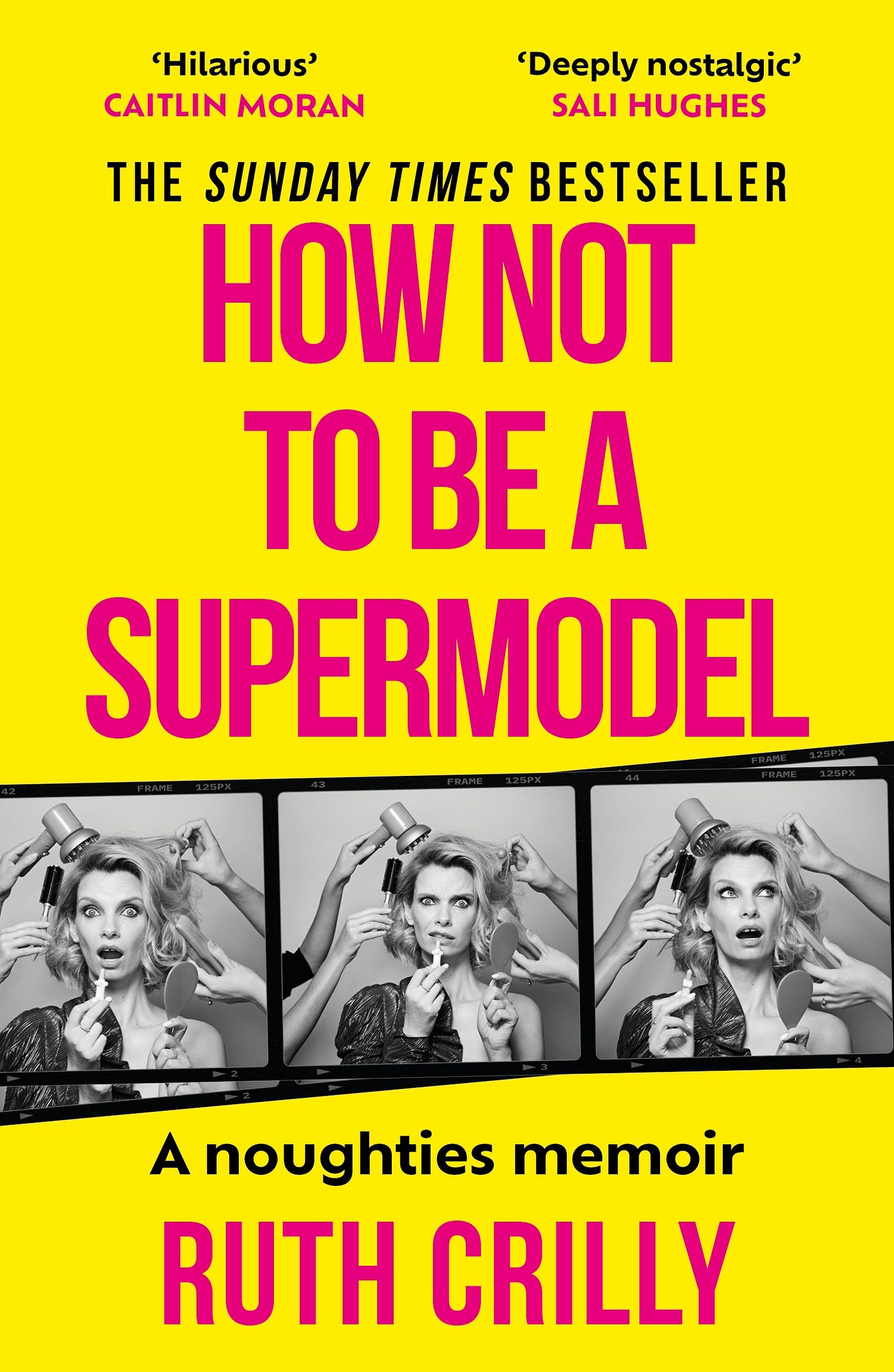How I Wrote A Book
Here’s how I wrote my book, How Not to be a Supermodel. It isn’t a technical breakdown, you’ll be pleased to know - I’m not going to bore you all by going into enormous detail about the huge restructure I did for the second draft, or how I had thirty-seven different versions of the first chapter. This is going to be a list of things I did to keep myself on track during the writing process. Practical considerations. Tricks I employed in an attempt to stay focused.
And I know I’m not an expert in this area! I’ve published one book. I’m not professing to be some sort of prolific literary genius who will share the secrets to guaranteed bestseller success. I just want to tell you how I managed to get my book over the line without losing my mind.
Though I should begin by telling you that How Not to be a Supermodel was not my first time at the writing rodeo. I had already written a novel, about nine or ten years ago. Why does this matter? Two reasons. Firstly, I want to drive home the fact that getting a publishing deal and then delivering the final goods was not something that happened to me overnight. Secondly, and perhaps more importantly, I suppose I want to stress that I didn’t need to have a book deal on the table to actually sit down and write a book.
When I wrote the first one, I just had a story in my head and I really, really wanted to tell it. It was almost a desperate sort of need, as though I couldn’t not sit there and get it down on paper. Has that first book been published? Erm, nope. (Still waiting for the publishers to be in the market for a story about a mad scientist who invents a machine that breathes life into inanimate objects.) Were those few months some of the best months of my life? The most challenging but also the most rewarding? Absolutely without any doubt.
I started writing regularly over twenty years ago, when I decided to do an undergraduate course in creative writing with the Open University. I had left my law degree in 2001 to become a model (read all about it) and a few years later, career in the modelling industry firmly established, I decided to do what I’d always wanted to do anyway and enrol on a writing course.
In all honesty, I don’t know how I’d ended up doing law in the first place. I remember saying in secondary school that I wanted to write books, but being told that it wasn’t a career or a proper job - it was too unreliable as an income source, too unpredictable. I was a grade A student (until I discovered boys and it all went downhill) so at the point where we had to choose universities and subjects I was semi-funnelled down the Oxbridge route to do law.
Two things about me that would have made me a terrible lawyer: I cannot lie, I hate confrontation and I’m useless under extreme pressure. Also, apparently I can’t count. Little known fact that I don’t think I’ve ever told anyone before: I actually got through my Oxford interviews and had a provisional place to read Jurisprudence! (Which is their fancy course name for “Law”, because they have to be different and give difficult names to things that were formerly easy to spell.) When it was time to take the place I begged my Mum to phone them and release me from it because I didn’t want to leave home. What a sap I was. I mean, I didn’t want to leave home to go half an hour down the road to Oxford for a university course that would have landed me an excellent, solid and respectable job but then ended up in Paris, Tokyo, New York and Milan in weird little bedsits chasing the most unreliable career on the planet. The irony!
Anyway, all of this ramble is to point out that I had always wanted write creatively and so just as soon as I was a proper adult and I had a bit of money coming in from my modelling, I enrolled myself on an OU course. And from that first day, I started writing into my little notebooks (I didn’t have a computer at first) and I didn’t ever stop. I went on to do a degree in Literature, some postgraduate courses in creative writing and then, because I truly loved the structure and discipline that degree courses brought to my otherwise chaotic life, I went on to do an MA in creative writing at Royal Holloway.
Did I need to do these courses in order to write a book? Not necessarily. There’s a saying that goes around that’s something along the lines of you can’t teach someone how to write, and to a certain extent I’d agree. I think the main thing is that you have to want to write and you need to have something in your head to write about - if these things don’t exist then no course is going to magic that up for you. What I will say is that these courses, especially the MA, helped me to think critically about my own work, to develop a certain amount of endurance and discipline and to establish a good, enjoyable writing routine. I came out the other end of these qualifications and courses loving the writing process more than ever. (If you have the time and means to do one, I can highly recommend the Open University for its flexibility and course quality.)
Oh my God, this is like one of those recipe blogs where you just want to get to the ingredients and method section and the blogger gives you their life history! And then a detailed rundown of how they came across the recipe, how it has evolved over the years and how they’re going to pass it on to their grandchildren in a leather-bound tome! And then they give you seven different variations of the method, one of which is just “adding a parsley garnish”, and then follow this with a list of the kitchen equipment you’ll need and what you can use instead of a sous vide machine if you don’t have a sous vide machine!
I suppose I’m including all of this backstory, at the risk of losing 80% of you along the way, to show that writing - for me at least - is not a flash-in-the-pan overnight success story. It has been almost ten years since I wrote my (as yet still unpublished) crazy scientist novel (I do it a disservice with this description, it’s an absolute riot!) and my writing life has been hindered by long periods of imposter syndrome and even longer periods where paying the bills had to take priority and left no room to really work on the things I wanted to work on.
But I have written almost every day, in some form or another, for all of those twenty-odd years. I just really, really like writing. I have never been in a position, work-wise, where I can devote all of my time to it (it’s a mission trying to find any time to devote to it, the dream would be to pack everything else in and just sit at my rickety desk in the cabin, thinking up stories!) but it has always been my overarching priority. My ongoing goalpost. Write more.
Is there a way to carve out the time to write, when you have a thousand other jobs to do? And then how do you block out all of that exterior noise, how do you sit down and write and then stay writing, without distraction?
I can’t speak for others, but here’s what I do:
THE ONE THING.
Years ago I read (or semi-read, I got bored once I’d got the gist of it) a book that was all about concentrating on the One Thing. Rather than having eighteen things on your to-do list for the day, you had to choose the most important one and then only do that thing. And you could expand it out, so that it was for the week or for the month or the year: choose your priority, choose the thing you really want to do, to excel at, or to simply complete, and only do that thing until it is done.
Adopting that mindset, that I had to have laser-focus on one thing, one priority, was how I managed to write my first novel. (Crazy scientist invents mad machine, as yet unpublished, keep up.) And I know what you’re thinking, you’re thinking that’s all well and good for YOU, if you managed to just clear the decks and write for weeks on end without any other care in the world!
Wrong. I didn’t stop work, or even really reduce my work output, when I was writing that book. (It took about nine weeks of writing for four hours a day, by the way. Seven days a week. Laser focus.) I didn’t stop work and I don’t say that to brag, or to make anyone feel crap, I say it because it is proof that the One Thing method worked.
For me, it was because I had clearly told my mind that it had one thing to do and that until it was done, it didn’t need to concern itself with any other matter. It cut out the noise in my overwrought mind and gave me this enormous sense of relief, that I could close all other tabs and just concentrate on the task at hand. (Which was a task that I really wanted to do, by the way, so that helps, doesn’t it? But I have applied this method to all sorts of things, from doing my expenses to writing creative treatments for social media brand deals, and it always works.)
Now before you go absolutely bananas screaming that you can’t very well stop work just to concentrate on the One Thing, let me expand on the idea and explain it in more detail. I can’t remember whether this was in the book or whether I’ve modified the method, but this is important: just because you’ve identified the One Thing doesn’t mean that’s the only thing you can do that day. It just means that it’s the thing you do first, either for an amount of time you’ve set, or until it’s done. And until that cut-off point, nothing else gets a look in.
When it comes to writing, or something that is ongoing and long-term, you really have to set yourself a daily limit for this to work - perhaps it’s a thousand words, or, more practically, maybe it’s a time limit. Three hours. An hour and half. The point is, you honour that commitment and you don’t stop or allow distraction until it’s done. And you know what? Even if it’s twenty minutes, even if that’s what you can allow yourself, it’s still amazing to consistently do whatever it is that you have prioritised.
This is how I managed to write the book about the mad scientist (I know you’re all desperate for this book now!) and then still do my paid work, in just about the same number of hours I’d had before. Because I had a clear goal and focus for each section of the day, I found that I could plough on through with minimal interruption.
And can I say, as a side-note, that this approach can also make you feel extraordinarily happy? The happiest days of my working life were spent writing How Not to be a Supermodel, and I think that it’s because a) I love writing but b) I gave myself permission to make it my priority. Every morning I knew exactly what I needed to do; I left my phone on the hallway table (see later tip), set myself up at my rickety Argos table (again, later tip) and got straight down to it. I didn’t think about anything else. Sure, once it hit 3pm I shut the laptop and then all hell was let loose as I checked my work emails and realised I had to film two reels about hyaluronic acid serums and also drop the kids at gymnastics, but the bulk of the day was BLISS.
THE NEW SPACE.
To write How Not to be a Supermodel I had to find a totally new space to work in that I didn’t already associate with any other type of work or activity. And I’ll tell you why: everywhere else was too distracting. Even the mere memory of other work was distracting. At that time my office was also my beauty storage room and so all I saw, every time I looked up, were stark reminders of all the posts that I hadn’t finished editing, the videos I needed to shoot.
If you have a clear workspace that is meticulously tidy then great. I had to traverse my way around the house, holding my laptop in front of me like a divining rod, trying to find a little space that wasn’t tainted with my chaotic, disorganised personality.
In the end it was a sad corner of the living room - a corner that only usually gets any attention when the Christmas tree is plonked in it. Perfect. I had no emotional attachment to this corner - I’d never panicked about a deadline in it, or scrolled through the Rightmove app in it, or filmed a Youtube video in it. This would be my writing space. Emergency writing space, by this point, because I’d missed two deadlines (blatantly not following my One Thing rule) and things were getting serious.
THE SPECIAL DESK.
You don’t need a special desk to write a book, or a special chair, but my desk was too heavy to carry down the stairs and I so I had to buy a special one (£20 from Argos, the Habitat Airo) and then a special chair (again, Argos) because my proper back-saving fancy chair didn’t fit properly with the new desk.
The reason I say that you don’t need a special desk or special chair is that it categorically will not help you write. If you’re comfy then yes, things might flow better, but my Habitat Airo was possibly the worst, most uncomfortable chair and table combo I’ve ever experienced and I was belting out the words. The desk wobbled and clanged with every keystroke, the chair was about as ergonomic as a broken see-saw but still I sailed through those hours, barely noticing that I had the same office set-up as a WW2 field clerk.
What I liked about this (continuously swaying) furniture pairing was that I began to associate it with productivity and, because of the success of the One Thing method, as soon as I sat down my entire body knew exactly what it needed to do. My brain switched into high gear, my legs began their daily worry about getting deep vein thrombosis, my back steeled itself against the inevitable muscular stress that it was about to endure and my hands, God bless them, positioned themselves above the keyboard, like nimble little butterflies.
We were at one: the Christmas Tree Corner, the rickety desk and I. My point, which doesn’t come across at all clearly, is that I carved out a space that felt as though it belonged to the book and although the desk and metal folding chair were pretty rubbish, they became part of the routine.

THE NO PHONE ZONE.
This one’s obvious. I don’t even need to elaborate, do I? Every day, when I was writing, I switched my phone to Airplane mode so that it wouldn’t ring and then I left it in another room. I didn’t even want to hear vibrate. I didn’t want to see that screen light up or sense that a notification had pinged to tell me that the doorbell had rung or that there were 200 bonus Nectar points if you bought a 500ml bottle of Innocent Orange Juice.
I think that not having a phone - and I mean anywhere near me - was possibly the best thing that I could have done, productivity-wise. I knew instinctively when it was time to have lunch, because it was hungry, and then in the afternoon I’d set an alarm so that I knew there’d be a hard stop. You can buy an analogue timer or clock if you need to keep more of an eye on the time, but for this to work then everything else must be switched off and away.
I also turned the WiFi off on my laptop and closed down all of the apps. If I needed to do any research, which was usually “using the thesaurus five times a minute because my brain lost its ability to recall more than twelve words”, then I tried to do it at the end of a session. I’d mark the manuscript by typing a huge line of
XXXXXXXXXXs
to remind me to search for the word or fact later, and then I’d just move on. When my time was up for the day, I’d go back and check the XXXXXXXXXXs and do all of my looking-up and Googling in one hit. I’m positive that this saved me hours - days - of wasted time.
THE EAR PLUGS
I have to work with ear plugs in. I have to sleep with ear plugs in, too - I am massively noise-intolerant - but when I’m working I must have a dulling of the ambient sound. It’s not as though I need silence, I just can’t bear it when inconsiderate people make unnecessary noise - it’s the injustice of it that riles me more than the inconvenience of the noise itself. People allowing their dogs to bark for hours on end, people playing videos and music out loud on their phones. Once these annoyances have crept on in, I find it almost impossible to concentrate.
The best ear plugs? ANY. It’s not as though I’m sleeping - if I were then it would be the Alpine Sleep Deep, for superior comfort - I just want the biggest and best noise block possible. OR I play white noise through earpods, but that means that I need my phone in close proximity and it all just becomes too tempting to pick it up and check whether “something important” has come in. So ear plugs are my first choice.
God, is any of this helpful? I feel as though I’m stating the obvious here! The main things for me are to remove distraction, to prioritise the writing process above all else - to really and truly prioritise it, write it down on a daily schedule if needed! - and to create a space that is only for book-writing. Shit desk and chair, ear plugs in, phone nowhere in sight and I’m away.
All of the usual “writing advice” clichés turned out to be true, too; just write anything rather than nothing, don’t stare at an empty page, be consistent… None of which are that helpful when you’re right at the start of a book and it feels like an insurmountable challenge. Although I have to say that I personally think it should feel like a good challenge - an exciting one. And if you don’t love it, if you dread sitting down, if the words never come or if the idea of teasing those words out doesn’t fill you with excitement, then I think it’s worth re-evaluating what you’re writing and why you’re writing it.
One more thing: my favourite book on writing, ever, is aptly called On Writing and it’s by Stephen King. I’m not even a huge Stephen King reader, but this part-memoir part-manual is just so inspirational, so simple in its instructions, you cannot fail to feel a bubble of excitement as you read it.
If you fancy a brilliant summer read then you can pre-order the paperback version of my book, How Not to be a Supermodel, here. By pre-ordering you signal to the booksellers that there is demand and this is hugely helpful to writers. If you’d rather have a hardback copy then that’s already out - see here! Thank you, as always, for your support. I am eternally grateful and I LOVE the messages I get every day from people who have started it and can’t put it down!






Excellent advice. I've read the hardback version and can thoroughly recommend it, although it does bring back certain memories I thought I had buried. Can I ask, how (if at all) do library "borrows" count towards signalling the publisher that there is demand for your book?
Great advice ! In order to write you can’t wait for the muse you just have to write - even if it’s crap - you can’t edit an empty page ! I wrote my memoir about squatting in the 70/80s because no one else had written anything about it and there were stories that needed to be told to the younger generation - like yours ! Thanks - can’t wait to read your book xxxz